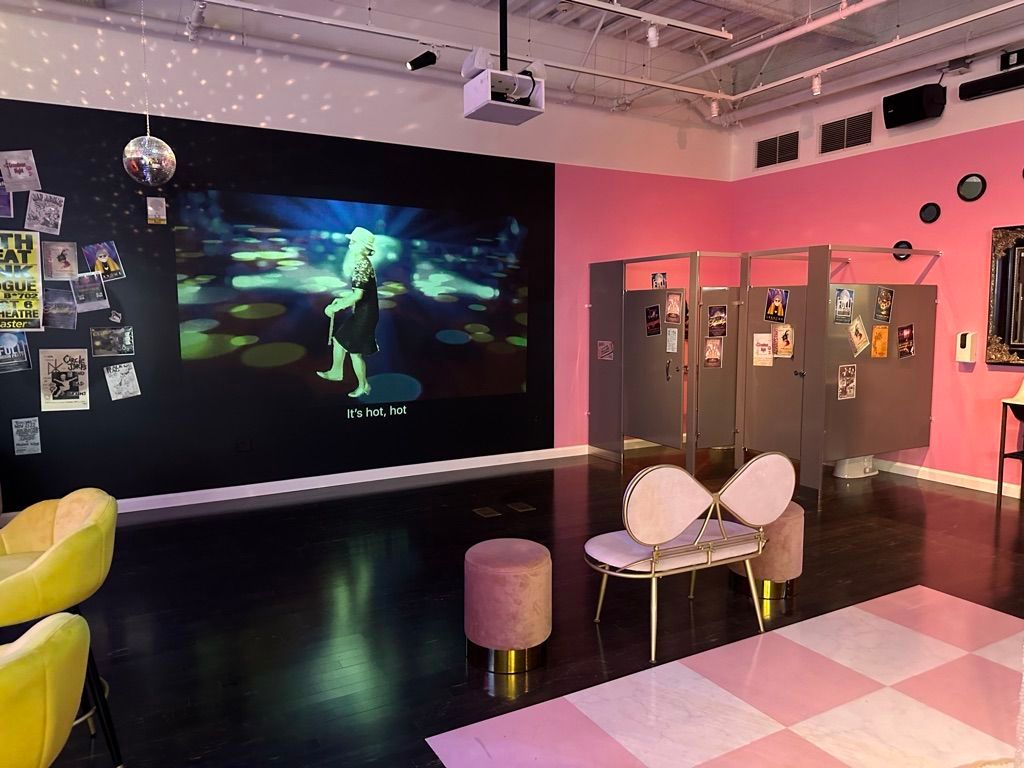Grandmas Gone Wild
Spring break came early for these singing, dancing, and jamming elders. Someone get the grandmas under control!
By Rebecca GiordanoJanuary 28, 2024

YOSHIE SAKAI: GRANDMA ENTERTAINMENT FRANCHISE, Vincent Price Art Museum, Monterey Park, October 21, 2023–February 3, 2024.
Like the siren song of a real nightclub, a karaoke version of “Fergalicious” lures visitors from the front desk of the Vincent Price Art Museum into a kitschy carnival for an unlikely audience. Yoshie Sakai: Grandma Entertainment Franchise features three installations that each simulate a commonplace leisure space: Grandma Day Spa, Grandma Nightclub, and Grandma Amusement Park. Past a merch stand, past an inflatable heart-shaped pool–cum–video screen in front of two tulip chairs serving as Grandma Day Spa, past the merry-go-round with TV/VCRs riding sorbet-colored cryptids, visitors reach Grandma Nightclub. The videos on the carousel show duplications of Sakai in gray wigs dancing, playing instruments, and hyping up other grandmas.
Across the gallery space, handmade ceramic, bronze, and iron sculptures mingle with mass-produced trinkets and furniture. Using features like the carousel, the inflatable pool, and two metal toilet stalls, the surreal, interactive installations display Sakai’s videos, her primary medium. All but two videos feature Sakai in her grandma personae. Though real grandmothers appear in the exhibition in photographs, the “Grandma” of Grandma Entertainment Franchise is an archetype, not a person: she’s effusive, mythic, fantastical. You wouldn’t mistake Sakai’s herky-jerky movements and slipping wigs for a woman of advanced age. Her performances in the video teeter on stereotype, but with a political goal in mind.
Sakai playfully invites us to imagine how the world might be if a different set of sensibilities and needs guided it. Sakai critiques ageism, misogyny, and racism, but is no feminist killjoy. Her work makes an unmissable point about exclusion without finger-pointing or the pretense of art somehow resolving complex social problems. The exhibition is a bombastic, silly, and temporary experience. Because of its carnivalesque tone, her zany grandma world permits a joyous rejection of how things really are with no expectation of permanence or resolution.
Where the outside world punishes women for the crime of aging, the carnival inverts this dynamic by placing older women at the center of a reimagined cultural landscape. Here, they are heroic, immortalized in sexy songs and triumphant monuments of Styrofoam painted silver. Sakai’s videos imagine these bodies doing things they are not supposed to do in places they are not supposed to be. Unlike Luna Luna, the dry, big-budget amusement park revival downtown, Sakai’s pop sensibilities skewer rather than exalt capitalism. Sakai’s fun house critiques the marginalization of women and the elderly but keeps it breezy.
In this carnival, the sacred and profane, the high and the low jumble. A madcap ceramic fountain of grandma faces made me produce a sound between a coo and a groan that morphed into a sincere chuckle when I noticed the store-bought gray hairpiece attached. Sakai told me her own mother called the sculpture “ugly.”
Grandmothers imply the existence of mothers. In the video Bathroom Stall Tears II (2022), Sakai plays herself in utero. As a caricature of her fetus self, Sakai pleads with her mother to abort her so that her mother can have a better life. The bleakly funny suicide plea is installed on the door inside a toilet stall, viewable from crochet-covered toilets. More subtly—and citing personal experience—Sakai addresses how poor and immigrant families face generational divides that can become cultural ones. She is sensitive to the intergenerational closeness that the inability to outsource care engenders, for better or worse. Growing up in the same house as your grandma makes you different.
¤
Photo by contributor.
LARB Short Take live event reviews are published in partnership with the nonprofit Online Journalism Project and the Independent Review Crew.
LARB Contributor
Rebecca Giordano is an art historian based in Los Angeles.
Did you know LARB is a reader-supported nonprofit?
LARB publishes daily without a paywall as part of our mission to make rigorous, incisive, and engaging writing on every aspect of literature, culture, and the arts freely accessible to the public. Help us continue this work with your tax-deductible donation today!